Wisdom Teeth And Braces
WHAT SHOULD A
TOOTH EXTRACTION
WHAT SHOULD A TOOTH EXTRACTION
LOOK LIKE WHEN HEALING
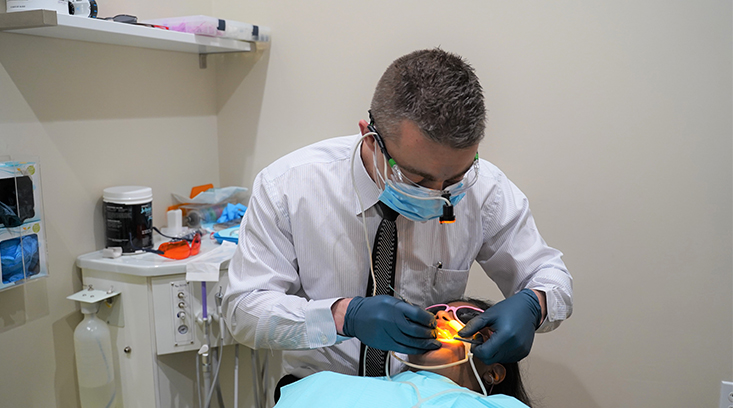
HOW LONG FOR WISDOM TEETH HOLES TO CLOSE
AFTER WISDOM TOOTH EXTRACTION
The ideal way to treat a severely damaged tooth is to extract it. Whether it’s due to cavities or trauma, a damaged permanent tooth can be extracted and restored in another way. It’s often easier for orthodontists to refer you to a general dentist to remove any other tooth but the wisdom tooth. These are the third set of molars found in the back of the mouth. Each jaw has 2 wisdom teeth stages and they naturally erupt at the age of 17 years going forward. It takes a professional who is knowledgeable about oral and maxillofacial surgery to save the situation. There are times when the removal of this last molar is simple and quick. It depends on whether your wisdom teeth have fully erupted or not. If you have the so-called impacted teeth, you might endure dental surgery. It is a wonderful thing that wisdom tooth pain can be controlled with anesthesia. The only thing you need is a dental expert who has been practicing for years and has seen different cases of wisdom teeth surgeries. After having a consultation with your local orthodontist, he can determine if the wisdom teeth will interfere and to which doctor to send you to.
HOW LONG DOES IT TAKE
FOR WISDOM TEETH HOLES TO HEAL
The wisdom teeth healing timeline process is faster when wisdom teeth removal surgery is between ages 15 and 25 or when third molar roots are 2/3 developed. Wisdom teeth recovery timeline is less because:
- Bone is softer and easier to remove
- Roots ends are straight, incomplete, and not curved
- Less chance for nerve damage roots are farther from the inferior alveolar nerve
- 4 stages of the healing process are faster and more predictable in a younger person
- Less chance of having a systemic disease and more wisdom teeth health complications like wisdom tooth holes, not closing.
HOW LONG SHOULD WISDOM TOOTH PAIN LAST?
Recovery after the extraction of a wisdom tooth can be differently related to each person. Some patients after extraction may experience discomfort for a longer duration than others. Other side effects after the surgery may comprise swollen mouth and cheeks, mild apparent bruising, stiffness, dullness, or prickling in the mouth. The healing process as per timeline:
- After two or three days of the procedure, patients may experience diminished swelling in the mouth and cheeks.
- The level of discomfort after wisdom tooth extraction healing stages typically lasts from two to seven days but most patients resume their normal routines within two or three days.
- In any case, if the procedure needs stitches, your dentist will remove them within 10 to 14 days. After two weeks of the treatment, you will be able to feel normal as the bruising will go away.
- After the extraction, in the initial twenty-four hours, patients may experience blood clots around the treated area. This will act as a protective shield over the exposed bone and nerve endings and a base for the development of new soft tissue as well.
WHY PULL OUT YOUR WISDOM TEETH?
Most people have wisdom teeth extracted for one or more of these reasons:
- Preparation for orthognathic surgery.
- Pericoronitis – acute or chronic infection at the site.
- Pre-radiation therapy for head and neck cancer.
- Persistent facial pain that can not be localized.
- Accident and wisdom tooth in the line of fracture.
- Resorption of the adjacent second molar.
- Smallmouth. If your jaw lacks enough room for the last molars to grow, you need to have a dental surgery procedure to remove them.
- The poor angle of an eruption. Sometimes wisdom teeth do not erupt at the right angle. They may press against your other teeth, causing discomfort.
- Impacted – When your wisdom teeth fail to erupt fully or normally, they are called impacted teeth. They are usually trapped in the jawbone or gum tissues, causing pain.
- Cysts or fluid-filled sacs may form in the soft gum tissue near impacted wisdom teeth. If not treated, cysts can develop into tumors and tumors could have major consequences for the overall health.
- Cavities or active gum disease. Wisdom teeth may form perfectly and later develop cavities or periodontal disease around them. This mostly happens due to their difficulty to maintain cleanliness. Moreover, you can have the third molars teeth removed if you develop severe gum disease around the distal of adjacent teeth.
WHY IS THERE
WISDOM TOOTH PAIN?
Some people experience pain in the back of their mouths and might be wondering what is causing this issue. There can be any number of things that might be causing this pain, and one big one that you need to consider and talk over with your dentist or orthodontic office is the possibility that it could be your wisdom teeth.
You can have wisdom teeth pain for a whole myriad of reasons such as a cavity or wisdom tooth hole is causing pain exposing a nerve. There may have been an improper eruption and even infections in the gums. This all leads many people to ask a very simple question – how long does wisdom tooth pain last?
HOW LONG DOES IT TAKE
FOR WISDOM TEETH TO HEAL
If you need to have them extracted, you may also wonder what is your wisdom teeth recovery time? How long does it take for wisdom teeth to heal? And is wisdom teeth healing a possibility for you?
After the procedure is concluded, you may need to consider other questions like how long does pain after wisdom tooth extraction last? What is the wisdom teeth removal recovery time after your extraction? And is there anything you can do to affect how long does the pain last after tooth extraction?
WHAT CAUSES WISDOM TOOTH PAIN?
All of these are absolutely excellent questions that need to be discussed with your dental or orthodontic office. Let’s tackle the first subject first – what can be causing your wisdom tooth pain? As mentioned before, the pain can be caused by any number of things such as disease or exposed nerves, but it is especially likely if you have impacted wisdom teeth. The Mayo Clinic describes impacted wisdom teeth as the following:
Many people develop impacted wisdom teeth — teeth that don’t have enough room to erupt into the mouth or develop normally. Impacted wisdom teeth may erupt only partially or not at all.
An impacted wisdom tooth may:
- Grow at an angle toward the next tooth (second molar)
- Grow at an angle toward the back of the mouth
- Grow at a right angle to the other teeth, as if the wisdom tooth is “lying down” within the jawbone
- Grow straight up or down like other teeth but stay trapped within the jawbone. (Mayo, 2018)
Needless to say, when teeth are impacted in this manner, it makes it far more likely that you will experience minor or significant to wisdom tooth pain. This is because the angle can be grinding against other teeth, could be pressing on a nerve, could be crowding against other teeth, and potentially can open up avenues to infection since wisdom teeth are notoriously difficult to brush and floss properly due to their isolated location in the back of the mouth.
Time to extract wisdom
and unleash your best smile
with Ivanov Orthodontist
CARE OF WISDOM TEETH
It’s the lack of brushing and flossing that can often lead to plaque build-up, cavities, and inflamed gums which can make the teeth and surrounding area feel sore and puffy. Not only that, but teeth coming in at wrong angles can also cause problems further down the line. While your wisdom teeth might be impacted and painful themselves, if left untreated, they can very easily lead to significant pain for other parts of your teeth as some are shoved and ground against each other, leading to problems for the surrounding areas as well. This can also impact your ability to bite correctly which can further compound the problem.
DO I NEED TO HAVE MY WISDOM TEETH PULLED?
This often leads many people to wonder if wisdom teeth extraction is necessary. While only your orthodontic office could let you know for sure, there is still debate about whether all cases of wisdom teeth need to be removed or not. Some dentists and orthodontists operate on the philosophy that if they are removed it will also resolve a potential chance of any problems in the future even if currently you do not have wisdom tooth pain or any issues.
Other doctors believe that if something is not causing a problem then it should be left until it begins to cause one. While there is merit to both sides of the conversation, if you are an individual who is definitely having pain and issues with your wisdom teeth, you should absolutely schedule a session with your local dentist or orthodontic office and have a discussion with them about your particular needs and whether wisdom teeth extraction might be needed for you. If you are thinking about wisdom teeth extraction, the Mayo Clinic also recommends you ask a wide variety of questions so you can understand the process better, know what you can expect, and know when you can get back to your normal life.
These questions should include:
- How many teeth will need to be pulled?
- Have they damaged the neighboring teeth?
- Have my nerves been damaged?
- How long will the procedure take?
- Can I use local or general anesthesia?
- How long will the results of the extraction last?
- What happens if the wisdom tooth hole never closed?
- What else will I need to do?
- When can I get back to my usual activities?
HOW LONG UNTIL WISDOM TEETH HOLES CLOSE
Getting answers to these questions and many more will help you have a better grasp on the process and help you make an informed decision about your orthodontic needs. The last thing anybody wants is to have continued wisdom teeth pain. If you are wondering how long does pain last after tooth extraction and if you are having issues then you should definitely schedule a meeting with your dentist or orthodontic office to learn more. Each case is different, as you may one wisdom tooth that is completely impacted while the one below it never even developed.
You will also want to find out from your dental professional when you can return to normal life, as what “normal” is varies from person to person. You should avoid strenuous activity for a few days, but you can go back to most jobs right away as long as you feel up to it. Unless you are a fitness instructor, then you should wait as you do not want to loosen the clot that has formed and possibly damage the stitches. When you see your dental professional, you can find out what is the root cause of the problem, what treatments are available, and what you can do personally to help alleviate any future issues. It may be something as simple as additional brushing or flossing are needed or perhaps it will require more intense treatment. The sooner you meet with a local orthodontic office, the sooner you will know and the sooner you can prevent any long-term issues from happening.
DIAGNOSIS OF
THIRD MOLARS
DIAGNOSIS OF THIRD MOLARS
AND DENTAL PAIN
Commonly, the patient with orofacial pain is referred by the general dentist for removal of wisdom teeth to a specialist. Often the dentist is unable to diagnose the dental pain and negative clinical findings. Patients can be referred for extractions of wisdom teeth rule out the third molars as a cause of the pain and possibly monitor wisdom tooth healing stages after tooth extraction and pain levels. If there are obvious aggravating factors such as purulence, pericoronitis, extensive caries, or other pathologic conditions then most likely the extraction of the third molars will make wisdom teeth pain after removal to be less. However, if the wisdom teeth appear normal and there is dental pain, the extraction of the third molars may make the pain after the removal of the wisdom teeth worse. The oro-facial pain may be due to TMD. So removal of third molars will further aggravate the symptoms of the TMD and induce more pain from the wisdom teeth removal surgery procedure.
WHAT TO DO
BEFORE SURGERY?
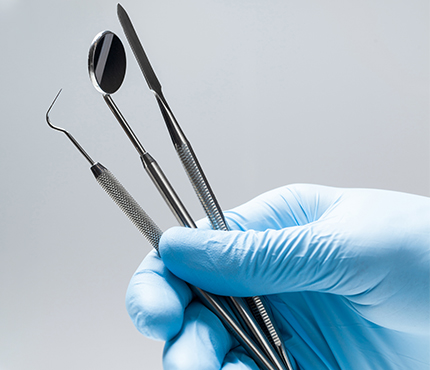
The right thing to do before enduring an oral and maxillofacial surgery is to meet a specialist. A clinic offering orthodontic services is the best pick. During your appointment, make sure you answer each question truthfully to get the right diagnosis. Expect your dentist to ask about your existing health problems and to provide the names of any drugs you could be using on a regular basis.
If the orthodontist gives you any additional instructions, you will have to adhere to them. Anything they say will be for your own safety. This could be with regards to what you do over the next few days, or if there seem to be problems with the teeth.
It is vital that you meet with your orthodontist before the decision to undergo surgery is finalized. It will not be just to discuss your teeth, but the chance to pass on any other details you think they will need. You will also get the chance to ask questions that may be troubling you. If you have any health issues, they will want to know as this could alter they way the removal is carried out. Any drugs that you are on will have to be declared and failure to do this could be serious. You also then ask what will happen before, during and after the surgery. You are bound to be most interested in the anesthesia that will be given. Some people may want to be numbed and kept being awake, while others will not want to see what is happening and prefer to be put under anesthesia before anything is done.
HOW LONG DOES IT TAKE FOR WISDOM TOOTH HOLES
TO RECOVER?
A wisdom tooth hole takes anywhere from 3 to 7 days to recover completely from the aftereffects of extraction. In case you have been through extensive procedures, it might take an additional couple of days. During that time, you may feel some bleeding and swelling.
WHAT ARE THE COMMON SIDE EFFECTS OF
EXTRACTING WISDOM TEETH?
After the wisdom tooth is extracted, you may experience:
- Trismus
- Slow-healing gums.
- Inflammation and ache in wisdom tooth hole.
- Damage to current dental work, such as issues with the adjacent tooth.
- Pain and swelling in your gums and sudden ache around the wisdom tooth hole.
- Painful inflammation is named as the dry socket, because of loss of protective blood clots.
- Bleeding for around 24 hours but if bleeding doesn’t stop from the wisdom tooth hole consult the dentist immediately.
When do wisdom teeth holes close?
The wisdom teeth hole not closing closes within six weeks. In the coming months, the sockets are filled with bone. It is important to keep the area clean during these six weeks.
PRE-SURGERY TIPS
If you feel wisdom teeth pain or are afraid of feeling it during surgery, just relax. Your oral surgeon will give you a shot of general anesthesia, intravenous sedation or local anesthesia to help you cope with the pain. The method picked will depend on the type of wisdom tooth extraction you will do. It’s good to discuss everything with your dental expert prior to the removal process.
If you will be operated on, get a person who can drive you back home to have a rest. Another thing to keep in mind is the number of teeth you want to remove and the amount of wisdom teeth extraction cost. If you have insurance coverage, the cost is likely to be lower. But if you don’t, you may have to pay more out of pocket.


WHAT YOU CAN EXPECT FROM THE
THIRD MOLAR EXTRACTION PROCEDURE?
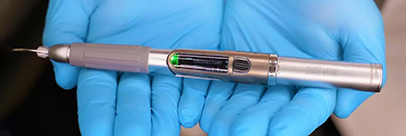
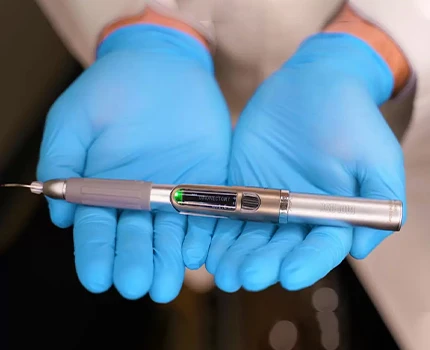

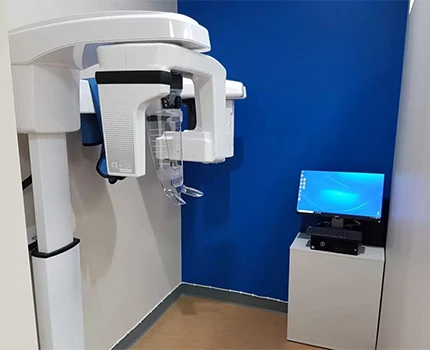


A wisdom tooth is best tackled by a trained and certified oral surgeon. The procedure begins with an X-ray and then the numbing of the area being operated on. An X-ray is taken to help the dentist view the exact condition of your gums and teeth. Before the removal of your tooth, your dental specialist will administer an injection of local anesthetic or pain medicine and the area will become numb. They may give you general anesthetic if you are undergoing real gum surgery to remove a tooth that stayed under the gums or erupted partially. General anesthetic will get rid of pain in the whole body. This is a decision that only your dentist can make correctly.
Next, the dental specialist will cut bone tissue and gum that covers your tooth. Using forceps, he or she will grasp the tooth and gently move it back and forth to cause it to loosen from the jaw bone and ligaments. If this doesn’t work out, he or she may remove your wisdom tooth in smaller pieces or through real surgery. A surgically removed tooth requires suturing to encourage quick recovery. It all depends on the degree of complexity met when trying to remove a tooth.
After the removal of a tooth, it will bleed profusely. To stop this, a dentist will ask you to bite down a piece of gauze to apply enough pressure to the area. Depending on how the wound looks like, he or she might decide to stitch it using a self-dissolving thread to close the gum edges and promote the healing process. The aim is usually to keep a blood clot within the socket. If it doesn’t form, you might end up with a dry socket condition and it is extremely painful.
If it occurs, you can only be cured at the dentist’s office, where a medicated dressing will be placed over the socket for a number of days. This dressing is known to protect the area from an infection and encourage the formation of a new clot. Once it does, the area will heal quickly and fill up.
POST-SURGERY TIPS
Once your wisdom teeth get pulled up through surgery, there will be a degree of discomfort, pain, swelling, and TMJ problems. A simple extraction may not cause swelling. If you will be bleeding, which will practically happen, apply a moist gauze pad to the surgery site. Bite it down to apply pressure on it for close to fifty minutes. If bleeding doesn’t subside even after biting down gauze, get in touch with your surgeon.
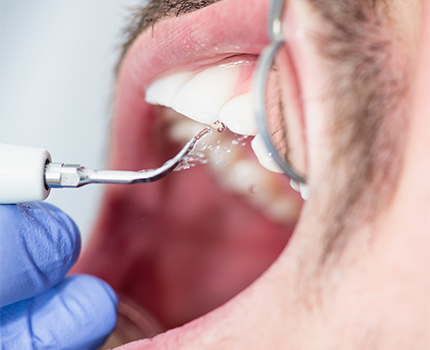
Swelling will happen after having a surgical wound sutured, but it should reduce in three days time. Place a cold compress on the outer side of your cheek near the site of surgery for ten minutes. Keep repeating the process with ice and without ice for 20 minutes. The swelling and pain will reduce. If it doesn’t, call your dental expert.
ARE THERE COMPLICATIONS OF THIRD MOLAR EXTRACTIONS?
As with all surgical operations, a wisdom tooth surgery may cause complications. Although the goal of an orthodontist is to keep you from enduring all the side effects and complications, these can happen. The problem is that the specialist might not notice any complications after surgery. These happen rarely though, as only 1 in 10 patients will get them. Furthermore, countless people have had their wisdom teeth pulled out without an issue. They often include the following:
- Swelling, discoloration, pain, bruising, malaise, or discomfort.
- Your schedule disruption due to a difficult recovery period.
- Bleeding that won’t stop for six straight hours.
- Trismus or being unable to open your mouth.
Learn More about post wisdom teeth extraction complications that need immediate medical attention at
https://ivanovortho.com/wisdom-teeth-healing-time-a-dental-clinic-in-miami-fl/
MORE REASONS TO REMOVE YOUR WISDOM TEETH
If your mouth looks crowded, it’s imperative to seek orthodontic services as soon as possible. It could be the reason why your wisdom teeth didn’t break through your gums. If some of your teeth are too big for your mouth, they might have left inadequate space for the wisdom ones to erupt through properly. See a dentist today and have your impacted teeth removed. If your immune system is currently comprised due to chemotherapy or an organ transplant, your doctor might recommend a tooth removal.
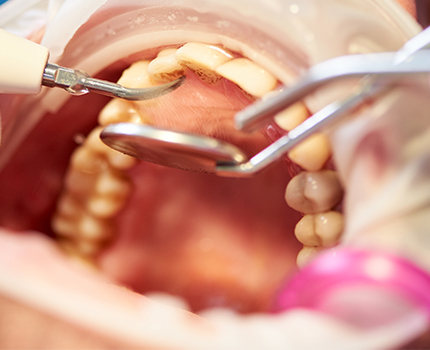
When your immunity is down, a compromised tooth can continue to get infected, even if you take antibiotics. It can cause too much pain and health complications, especially if it’s the last molar in your upper or lower jaw. If the tooth pulp is exposed by cavities, there is a reason to expect a lot of pain. Having a wisdom teeth removal surgery procedure can be the best way to stop the pain and to facilitate better healing process. In case that you have periodontal disease in the gum tissues and bones that surround and support your wisdom teeth, the only best solution could be extraction.
AMERICA'S TOP DENTIST
HEALING PROCESS
HOW LONG DOES IT TAKE FOR A WISDOM TOOTH SOCKET TO HEAL?
When your immunity is down, a compromised tooth can continue to get infected, even if you take antibiotics. It can cause too much pain and health complications, especially if it’s the last molar in your upper or lower jaw. If the tooth pulp is exposed by cavities, there is a reason to expect a lot of pain. Having a wisdom teeth removal surgery procedure can be the best way to stop the pain and to facilitate better healing process. In case that you have periodontal disease in the gum tissues and bones that surround and support your wisdom teeth, the only best solution could be extraction.
STAGE 1 - 24 HOURS AFTER A TOOTH EXTRACTION
The minute your wisdom tooth is pulled out, whether intact or in pieces, you will bleed. This bleeding will be controlled in the manner explained above. As well, you will get antibiotics and pain killers to eliminate your chances of developing an infection. Viewing the extraction site this early is discouraged because it might interfere with the clot formation. All the same, ensure that the bleeding has stopped and that a clot has filled the empty socket. Second, ensure that you aren’t feeling too much discomfort and pain. If bleeding or pain persists, visit your dental specialist again. If you had a difficult wisdom tooth extraction, it is possible that the area may swell and the face might be affected. These signs should go away by the third day. It is important to keep these things in mind:
- Use warm salt water solution to rinse your mouth severally.
- Take a rest immediately after the surgical process and as your local anesthetic continues to wear off. This will enable the clot to form without being interrupted.
- Don’t drink a beverage with a straw, touch the extraction area with the tip of your tongue or spit often. This might dislodge the clot being formed. If the gauze is full of blood, change it and stay calm.
- Return to your daily schedule the following day if you do simple tasks. If you strain a lot during work, you might want to rest another day or two to avoid dislodging your blood clot. So you might want to take a sick leave if you are going to have impacted teeth surgically removed.
- Avoid eating crunchy, fatty or sugary food like sugarcane, crisps, biscuits, cakes, and potato chips. Instead, eat smoothies, yoghurt, mashed potatoes, and other soft food. Avoid rice as a tiny piece might get stuck in the area and disturb the healing process.
STAGE 2 - WEEK 1 AND WEEK 2
During this period, you will be able to inspect the extraction site with ease. Opening your mouth will not be painful at all, and you will have resumed your normal eating habits. That’s because oral soft tissue lesions heal faster. If you had stitches, they would naturally be ready for removal by day 7 to 10. The amount of healing that will have taken place by the end of week 2 depends on the size of the wound. Wider and deeper wounds left behind after a molar tooth has been removed would generally need a longer period to heal properly. So by week 2, the hole may not show signs of filling in yet. During week 1 and 2, the blood clot that initially formed gets colonized and replaced by granulation tissue— usually rich in collagen. At this point you can work; however, you are advised to still avoid activities that could disturb the extraction site. The newly formed tissue is so tender and can bleed if accidentally poked. In most cases, though, the extraction site triggers minimal concern by week 2.
STAGE 3 - WEEK 3 AND 4
Soft tissue wound healing occurs in 3rd and 4th week. By one month most people are usually out of danger. Though there will be a small indentation in the jawbone corresponding to the original cavity, the area will be totally healed. Even after the healing, the area that your wisdom tooth once occupied may still look a bit indented. This can still be the case several months after. During week 3 and 4, mesenchymal cells are forming within the area’s granulation tissue. Soon these cells change into bone cells resulting to bone tissue formation along the bony walls of the socket. Bleeding is rare even if you chew hard food. The area is usually resistant to traumatic situations.
STAGE 4 - BONE HEALING
This is the last stage after having your wisdom tooth pulled out. The jaw bone’s tissue takes a longer time to heal and fill in the socket than your gums. You may attain total bone healing after six to eight months. You know that this process is happening when you see the socket filling. In the first weeks you will have a deep hole where food particles will get trapped. But after one month, you will notice that the hole is getting filled up. Ultimately, the entire socket will become full and smooth on the surface. There will be a considerable loss of bone height during the healing process though. Additionally, some bone tissue might be lost on the cheek side of your jaw, although loss will be insignificant on the tongue side. A greater degree of bone contour changes will be noticed after the removal of a wisdom tooth. If the dental specialist takes an X-ray after pulling out your tooth, it will show a bundle bone (a whitish outline enclosing your healing wisdom tooth socket).
It is the layer in which your periodontal ligaments (fibers that secure a tooth in place) were fixed. The bundle bone resorbs as the healing happens, giving way to new bone formation inside the socket. It should go away in about eighteen months. During the bone healing process, you will be able to work and follow your daily schedule without a single problem. Although very rarely, a piece of broken tooth might poke through your gums’ surface. This is considered okay, as it is your body’s way expelling an unneeded fragment.
WHAT TO DO WITH YOUR EMPTY SOCKET
IF IT IS NOT A WISDOM TOOTH
It takes six to eight months to attain complete healing of the jawbone. While you may choose to stay without a tooth, it’s not a must. There other ways to fill the gap and restore the prior function of your missing tooth. Solutions that are normally designed for empty sockets include dental implants, partial dentures and dental bridges. For best results to be achieved, you may be asked to wait until your dentist feels it is safe to move forward and gives you an appointment for a permanent solution. While you wait, you can have a temporary tooth installed until you get a permanent replacement tooth.
COST OF TOOTH SURGERY
It is important to find out more about wisdom teeth removal cost beforehand. If you would ask me, I would tell you to check orthodontist near me reviews on Google. By so doing, you will be able to read the opinions of other people who have had a wisdom tooth removed. If necessary, you should compare and contrast the rates charged by different dental clinics in your area. Additionally, select a dental clinic that has an orthodontist as the main doctor because he can coordinate better your dental care. Some clinics employ only general dentists without specialized training. If you have dental insurance, visit your insurer’s office and ask about the amount of money they can pay for you. With this knowledge, you can easily locate a service provider in your area who can meet your budget.
Learn More about wisdom teeth removal surgery cost at
https://ivanovortho.com/how-much-wisdom-teeth-removal-cost/
conclusion
Wisdom teeth are strong and useful molars, if they don’t have a problem. But if one or two develop cavities or trauma, you may not have an option but to have them removed. If your teeth didn’t erupt at all or they did, but just along the gumline, you can have them extracted. It’s necessary to go to the emergency room if you feel a lot of pain in your wisdom tooth or teeth. It could also be possible that they have made your gum swollen and inflamed. If that’s the case, let your doctor observe your teeth and the surrounding gums first. He or she might recommend a tooth extraction if they don’t have a better solution.
References:
Mayo Foundation for Medical Education and Research (MFMER). (n.d.). Wisdom Tooth Extraction [Magazine].
Retrieved March 2, 2021, from https://www.mayoclinic.org/tests-procedures/wisdom-tooth-extraction/about/pac-20395268
National Health Service. (2018, 04 04).
How It’s Performed – Wisdom Tooth Removal.
Retrieved from www.nhs.uk: https://www.nhs.uk/conditions/wisdom-tooth-removal/what-happens/
Norris, T. (2019, 03 07).
How Long Does It Take to Recover From Wisdom Teeth Removal Surgery.
Retrieved from www.healthline.com: https://www.healthline.com/health/wisdom-teeth-recovery
FIVE-STAR PATIENT TESTIMONIALS









